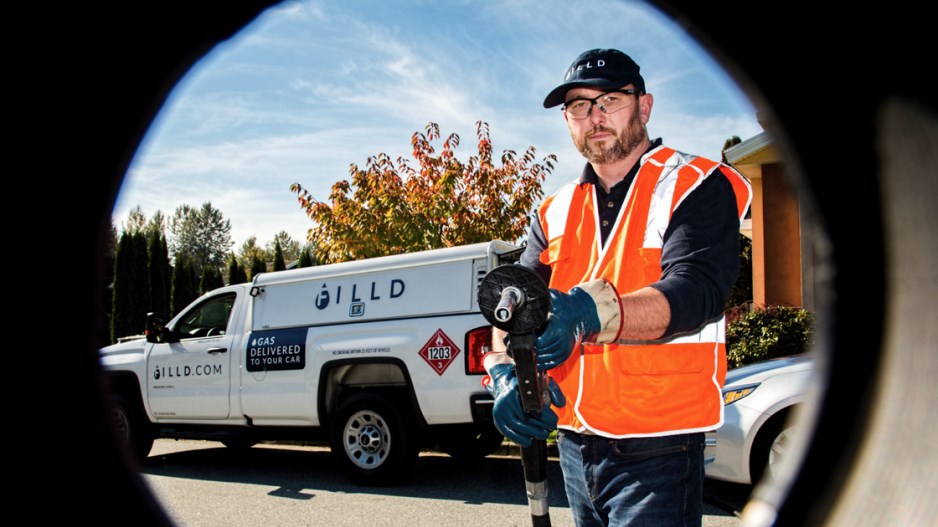Is the personal vehicle about to go the way of the horse and buggy in Vancouver?
In the three years since the BC Automobile Association launched its Evo Car Share service, Leslie Sims estimates, 11,000 cars have been taken off Vancouver streets as a direct result.
“This is just a great city for car sharing – things like high population density, traffic and parking challenges, congestion, pollution, affordability issues, high environmental consciousness,” Sims, Evo’s senior manager of strategic ventures, told an audience at the Greater Vancouver Board of Trade’s (GVBOT) transportation forum October 16.
“All of these things are correlated with a successful car-sharing market.”
Her 11,000-vehicle estimate is based on 2016 research from the University of California, Berkeley’s Transportation Sustainability Research Center, which found that nine personal vehicles were removed from Vancouver for every car-share vehicle introduced.
More specifically, two vehicles were sold and the purchases of seven were shelved for every car-share vehicle.
With Evo’s fleet of 1,250 cars shared among 105,000 members, the UC Berkeley research indicates a reduction of 11,250 vehicles.
A January 2018 study from Vancouver City Savings Credit Union (Vancity) estimated there are about 3,000 car-share vehicles in the city. That suggests, going by the UC Berkeley estimate, a reduction of 27,000 personal cars in Vancouver.
So as car-share fleets grow and ride-hailing services seem poised to enter the B.C. market in fall 2019, is the future of the personal vehicle really on the wane?
“It’s very much a significant trend that’s going on,” said Michael Buhr, president and CEO of Filld Inc.
His San Francisco-based company, which specializes in mobile gasoline fill-ups for vehicles, makes its Canadian debut in Vancouver next month following a US$15 million investment co-led by Calgary’s Parkland Fuel Corp. (TSX:PKI).
Customers use Filld’s mobile app to arrange for trucks carrying fuel rigs to fill up their vehicles.
Filld’s Vancouver pilot conducted last year provided mobile fill-ups exclusively to car-share vehicles.
The November launch will open up the business to personal and fleet vehicles, but Parkland USA president Doug Haugh told Business in Vancouver his company was drawn to Filld because the business model uses car-share services as anchor companies to guarantee revenue for Filld.
Buhr said he doesn’t see demand for vehicles falling as a result of new car-sharing and ride-hailing services, but acknowledges that “the way people use those vehicles is changing.”
Because car-share and ride-hailing vehicles are used more frequently than personal vehicles, they require more fuel refills.
Buhr said it’s Filld’s job to keep vehicles off the road when possible to address part of the “last-mile” transportation problem – the difficulty getting commuters from transportation hubs like SkyTrain stations or bus stops to their final destinations.
Personal vehicles solve the first-mile/last-mile problem in many instances. But in other jurisdictions, ride-hailing services like Lyft and Uber Technologies Inc. have been filling that gap, too.
Michael van Hemmen, general manager for cities west at Uber Canada, said his company is also investing heavily in using other modes of transportation, such as the newly acquired dockless electric-bike-share service Jump Bikes, to solve the first-mile/last-mile problem.
He told the GVBOT audience that Uber’s goal as a for-profit business is to become the platform of choice for transportation.
“Not just for cars but for all your transportation needs, where hopefully together we can stop reliance on personal automobiles,” van Hemmen said.
Eve Hou, TransLink’s project manager for new mobility, strategic planning and policy, acknowledged this can lead to some competition between transit, car-sharing services and ride-hailing services.
“But I think there’s also potential for huge collaboration,” she told the transportation forum. “They can provide options for people to get transit or provide [options] for people to get rid of their personal automobile and therefore open up all kinds of possibilities.”
For Sims, the likelihood of more people giving up the convenience factor of a personal vehicle comes down to pure economics: “The cost of owning a vehicle is so high.”




